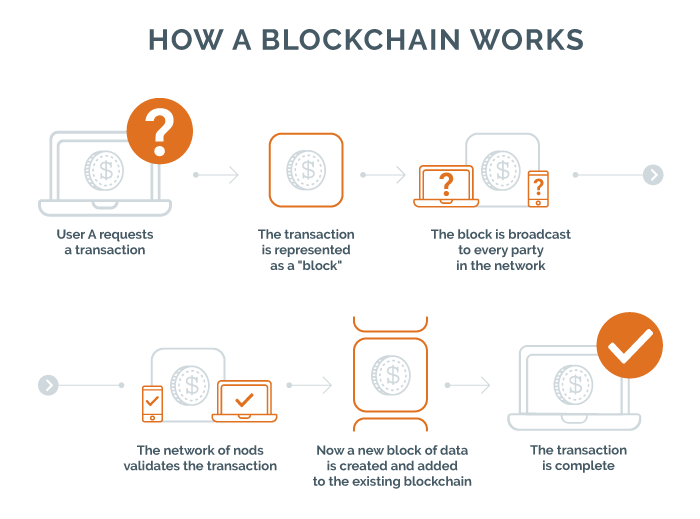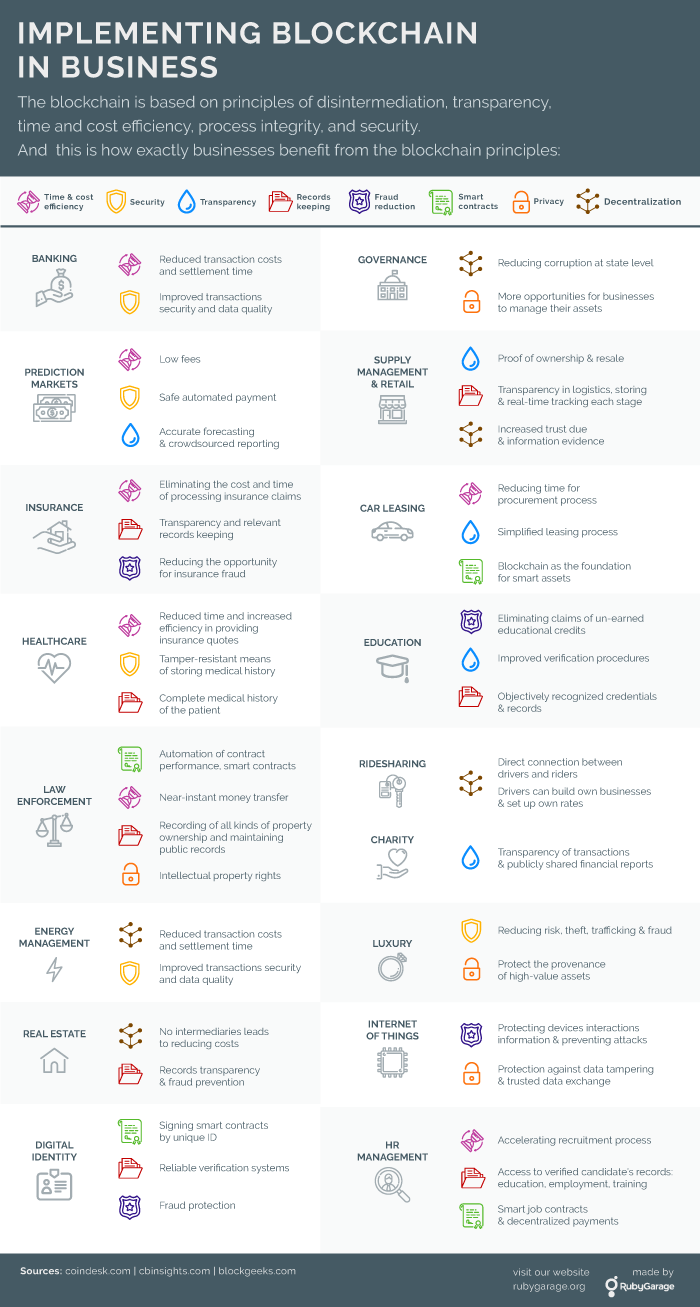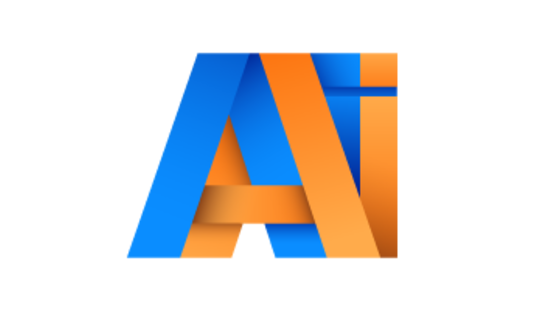-
Product Management
Software Testing
Technology Consulting
-
Multi-Vendor Marketplace
Online StoreCreate an online store with unique design and features at minimal cost using our MarketAge solutionCustom MarketplaceGet a unique, scalable, and cost-effective online marketplace with minimum time to marketTelemedicine SoftwareGet a cost-efficient, HIPAA-compliant telemedicine solution tailored to your facility's requirementsChat AppGet a customizable chat solution to connect users across multiple apps and platformsCustom Booking SystemImprove your business operations and expand to new markets with our appointment booking solutionVideo ConferencingAdjust our video conferencing solution for your business needsFor EnterpriseScale, automate, and improve business processes in your enterprise with our custom software solutionsFor StartupsTurn your startup ideas into viable, value-driven, and commercially successful software solutions -
-
- Case Studies
- Blog
Implementing Blockchain Technology in Business
“In five years' time, there won't be any internet companies. All companies will be internet companies or they will be dead.” Sounds pretty obvious, right? This statement sounded pretty arrogant in 1999, however, when Andrew Grove, then-chair of Intel, began his talk at the Investment Strategies Conference in Los Angeles with these words.
There was a lot of hype around the internet and its impact on business in the late 90s. Today, the trend that attracts the keen interest of the internet business community is the blockchain.
Gartner analysts claim in their recent Trend Insight Report that “the blockchain revolution promises to touch every industry.” And they have reason for this claim. While there’s a broad range of financial services that have already adopted blockchain technology, the blockchain is also finding applications in non-financial industries including retail, healthcare, real estate, education, law enforcement, and government.
So what is it about the blockchain and how exactly can you apply blockchain technology to your particular business? In this article, we’ll touch on blockchain use cases for the biggest industries and uncover the benefits this technology offers. But first, let's have a quick overview of what blockchain technology is.
What is Blockchain Technology?
A blockchain is essentially a global, public, cryptographically secure (and therefore trusted) ledger that automatically records and verifies large volumes of digital transactions.
A blockchains is implemented by three technologies: a) private key cryptography, b) distributed peer-to-peer networks with shared ledgers, and c) protocols for performing transactions as well as ensuring security and record-keeping. Here’s how the blockchain works:

The blockchain is built on the principles of transparency, immutability, and disintermediation. The disintermediation model ensures process integrity and security as well as time and cost efficiency.
Blockchain Benefits
Transparency, immutability, and disintermediation allow blockchain network participants to remove the need for a third party while performing trusted transactions 24/7. The blockchain significantly reduces fees, eliminates counterparty risks, and is able to withstand malicious attacks. Blockchain technology also empowers its users, offering them control over their transactions and data while reducing the clutter and complications of adding operations to a single public ledger.

So what about applications of the blockchain in business? Is this technology able to improve the way your organization works? And if so, how exactly might all the mentioned benefits add value to your own company or project?
Blockchain Use Cases in Business
The best way to appreciate the blockchain’s potential and determine its value for your business is to look at possible use cases. We’ve investigated the best practices for blockchain business applications and have identified specific use cases that we would like to bring to your attention.
Financial services
The financial services industry was one of the first to implement blockchain technology. Let’s take a look at some use cases.
BANKING
Banking stands to be disrupted by blockchain technology more than any other industry. Since a blockchain is a digital and tamper-proof ledger, it becomes an alternative to banks and traditional methods of financial transactions. The blockchain brings even more accuracy and information sharing into the financial services ecosystem.
Once banks realized the blockchain’s potential, they started adopting this technology. Swiss UBS and UK-based Barclays, for instance, apply blockchain technology to expedite their back-office operations and settlements.
Another example of blockchain adoption in the banking industry is a project to create a digital currency for financial institutions. This project was launched jointly by Deutsche Bank, UBS, Santander, and the Bank of New York Mellon to settle financial trades more securely, transparently, and quickly.
Meanwhile, the predictions for further blockchain development sound very promising: according to the Financial Times, implementing blockсhain technology in banking will cut up to $20 billion in third-party costs. Another cost-efficiency forecast has been laid down in the Santander FinTech study, which suggests that by 2022 banks should expect yearly reductions in infrastructure costs of between $15 billion and $20 billion.
While these predictions are encouraging for global banking giants, how can medium or small businesses capture their share of the banking industry?
One successful example of blockchain application in banking is Ripple, a company that helps banks process international payments. Using a blockchain model, the company has built a real-time gross settlement system that allows quick and accurate payment processing.
Another great example of the blockchain applied to banking is the startup R3 CEV. The core idea of this startup is to build a platform and commercial applications for distributed ledger technology. By bringing together 80+ banks, technology partners, and regulators, R3 CEV aims to become a “new operating system” for financial markets.
Benefits of blockchain technology for the banking industry:
Reduced costs
Shorter settlement times
Easier auditing
Better security
Improved data quality
PREDICTION MARKETS
Prediction markets have also been disrupted by the blockchain. Since the early 90s and the information technology revolution, forecasting and decision-making has attracted mass interest. Partly, this keen interest has been driven by over-regulation in the financial sector. With the invention of blockchain technology, forecasting has become an even more attractive area, offering even more opportunities. Apart from providing powerful peer-to-peer computing technology to financial companies, the blockchain has also provided a significant market-based forecasting solution for scientific applications.
Who are some of the pioneers in combining the power of prediction markets and the blockchain? One of them is Augur, a forecasting tool built on a decentralized network. Augur rewards businesses and individuals for correctly predicting the outcomes of real-world events (like elections, sport events or Oscar rewards results). Another forecasting platform applying blockchain technology is Stox. Stox users can trade the results of events, such as elections, sports matches, and many more categories. The prediction market platform Gnosis is an aggregator of relevant information from both human and AI sources.
Benefits of the blockchain for prediction markets:
Accurate forecasting
Low fees
Crowdsourced reporting
Safe, automated payments
INSURANCE
One of the key opportunities that blockchain technology offers to the insurance industry is data transparency. The blockchain automates insurance claims processing, and policy conditions can be written into smart contracts. Smart contracts are protocols that publicly and transparently verify compliance with a contract or enforce commitments. Holding a shared database and keeping records from being altered prevents fraud and provides customers with fair and timely payouts.
One proof of smart contracts is LenderBot, a micro-insurance solution launched by blockchain startup Stratumn in cooperation with Deloitte. LenderBot allows users to submit insurance claims through Facebook Messenger, which is simple and quick.
LenderBot demonstrates the potential for the insurance industry to validate insurance claims more easily, improve customer onboarding, shorten request processing time, and develop positive reputations through public verification.
Benefits of blockchain technology for the insurance industry:
Transparency and relevant record keeping
Reduced opportunities for insurance fraud
Reduced cost and time of processing insurance claims
Improved customer engagement
Of course, there are other finance-related applications of blockchain technology: peer-to-peer transfers, gaming, audit trails, stock trading, data storage, the sharing economy, and many more. Entrepreneurs believe the blockchain can transform many more industries.
Non-financial use cases
The blockchain has been recognized within the last nine years. Along with this recognition, many developments have been launched and applied to various industries.
HEALTHCARE
For medical and healthcare providers, the blockchain offers outstanding opportunities for storing an enormous amount of records, performing pre-authorization payments, and processing complex transactions.
A project named MedRec is using blockchain technology to solve issues with electronic medical records and provide a secure mechanism for recording and keeping them. MedRec is basically a decentralized CMS using smart contracts that’s tuned to help the entire community audit and share data.
Another blockchain startup providing data storage and verification in healthcare is Tierion. Tierion offers means for collecting, tracking, and storing medical records, as well as for performing digital payments securely and transparently.
Benefits of blockchain technology for the healthcare industry:
Complete medical histories of patients for use by physicians
Tamper-resistant means of storing medical histories
Reduced time and increased efficiency in providing quotes
LAW ENFORCEMENT
As with insurance and banking, law enforcement is generally organized according to a traditional model. Whether “law enforcement” refers to government officers or private agents, law enforcement entails some centralization of power.
The invention of the blockchain has spurred a new organizational model for law enforcement. In the blockchain model, intermediaries are cut out. This leads to reduced transaction costs and better protection of individuals’ and organizations’ rights.
Besides, the blockchain raises a number of legal issues, forcing legislators, regulators, and courts to offer a proper legal framework that can be replicated with the blockchain. These issues include transparency, misuse, and criminal fraud. By keeping all transactions transparent to millions of people, blockchain law projects provide tools to build a brand new kind of transparency.
The legal industry is taking its first steps toward adopting blockchain technology by creating the Global Legal Blockchain Consortium (GLBC). The GLBC envisions uniting the biggest law firms, corporations, schools, and major legal software providers, as well as court systems and governments in the future. Such global integration would completely transform the business of law by aligning firms, clients, and technology companies.
Along with this initiative, several lesser-known global startups are striving to link the real world and blockchain activities in the field of law. For example, the Elliptic company allows tracing of Bitcoin transactions. It offers investigation services to law enforcement agencies and leading Bitcoin companies.
One more example of blockchain in law enforcement is Integra Ledger, a provider of a new foundation for security, integrity, and interoperability for coping with all legal information – documents, contracts, etc. The blockchain technology that forms the cornerstone for Integra allows them to preserve legacy investments of law firms and their customers.
Benefits of blockchain technology for the law enforcement industry:
Near-instant money transfer
Automation of contract performance and smart contracts
Land registry and deed management
Intellectual property rights
Recording and maintaining property ownership and public records
ENERGY MANAGEMENT
Energy management is another highly centralized industry. However, new energy initiatives like solar and other home-based sources offer alternative power supplies. The next level of energy management is sharing energy sources through blockchain networks.
As distributed ledgers do in other industries, in energy management they can minimize or even eliminate the need for intermediaries, thereby reducing expenses. For example, startups like LO3 Energy and SolarChange are rethinking the traditional energy exchange process. LO3 Energy offers tools to create, share, and monetize distributed energy products and utilities.
One of the projects supported by LO3 Energy is the Brooklyn Microgrid. This project aims to build a microgrid community of Brooklyn locals who buy and sell energy produced from rooftop solar power installations through the blockchain. SolarChange, in turn, is creating a network of services and applications aimed at improving and increasing the use of solar energy worldwide.
Benefits of blockchain technology for the energy management industry:
Eliminates intermediaries and decentralizes systems
Promotes alternative energy sources and shared energy
REAL ESTATE
Vulnerabilities related to real estate include an impressive amount of paperwork, the possibility of illegal deeds, errors in public records, and lack of transparency, which in turn can lead to issues with unknown liens, missing heirs, and fraud. The blockchain offers mechanisms to mitigate these challenges, and the examples below illustrate how the blockchain can make a difference in the real estate industry.
velox.RE is a pilot project established in Chicago that’s enabling the evolution of the real estate sector by improving the transparency of all records and transactions. Based on blockchain technology, velox.RE will offer a solution for reducing the number of paper-based records, accelerating transactions and making them cost-efficient as well as allowing digitized property ownership, and property data exchange.
Ubitquity offers its customers a fully functioning Software-as-a-Service (SaaS) blockchain platform aimed at helping businesses in their e-recording and in improving transparency. Along with streamlining the process of inputting information and uploading records and documents into the blockchain network, Ubitquity offers cost-efficient transactions and a secure cryptographic ledger, ensuring protection of all assets and saving time.
Benefits of blockchain technology for the real estate industry:
Increased transparency in all the records
No third parties, and therefore reduced cost
Automated payments to property investors
Prevention of fraud
Smart contracts
DIGITAL IDENTITY
Digital identity is not that new of a technology. However, the possibilities the blockchain offers for this industry have significantly expanded its horizons. First of all, decentralization improves the security of stored data. Compared to storing records within a central authority, which is more vulnerable to attacks, a distributed ledger provides additional privacy and security.
Several startups are working on covering the needs for privacy and security as well as offering even more opportunities for blockchain network participants. ShoCard is one such verification system within the sphere of governance. It’s a digital identity card that’s always accessible for individuals and businesses, offering them a number of use cases for a mobile world, including uploading travel documents, website authentication through ID and many other cases. ShoCard positions itself as being so secure that banks can rely on it.
Another outstanding blockchain project, UniquID provides identity management features like peer-to-peer authentication, smart contracts, and local storage of trusted copies of agreements and documents to safeguard against any failure.
Benefits of blockchain technology for the digital identity industry:
Additional security and privacy
Reliable verification systems
Smart contracts can be signed by unique ID
Prevention of fraud
PUBLIC AND CORPORATE GOVERNANCE
There are many dimensions of governance, but the public sector and corporate governance might be the most affected by the blockchain. At the nation-state level, due to decentralization and transparency, blockchain technology can help to eliminate corruption globally. Besides, it unleashes enormous potential for citizens worldwide. Along with digital identity opportunities, the blockchain can completely change how we vote, pay taxes, and implement many government services.
Regarding corporate governance, blockchain adherents are struggling to eliminate the centralized involvement of governments in business, improve the security of companies' assets, and facilitate and accelerate business transactions.
Of course, there are several interesting startups in this field. The Bitfury Group provides secure, cost-effective, fast, and easy connectivity to the blockchain, helping governments, businesses, and organizations move their assets across its network. Another startup, Aragon, offers companies a tool to manage their entire global workforce, including handling payroll, accounting, fundraising, and other functions.
Benefits of blockchain technology for governance:
Eliminate government/third party involvement
Reduce corruption at the state level
Secure assets and assure data privacy
More opportunities for companies to manage their assets
Enable transparent, fast, cost-efficient transactions
INTERNET OF THINGS
As we’ve already mentioned, a blockchain is a decentralized network. Therefore, it offers a more secure model and protection against data tampering, which makes this technology a promising alternative to traditional IoT security systems.
Along with security and privacy, blockchain solutions also respond to another IoT challenge: cost. A traditional IoT network requires integration of all devices as well as seamless interaction among devices, connected systems, and infrastructures. Building and maintaining such networks is time-consuming and pretty expensive. In contrast, by having in place a secure model that ensures rigorous validity checks, authentication, data verification, and encryption at all levels as the foundation for your IoT ecosystem, the blockchain allows you to reduce the costs for building IoT networks.
Filament offers a good example of blockchain principles like decentralized communication, security, free exchange of value, and device autonomy. By providing both software and hardware, Filament ensures participants independent connections and transactions between devices. This decentralized model helps to prevent attackers from learning information about device interactions and keeps unauthorized entities out of disclosed data.
Another example of a solution to security and privacy challenges in IoT is a project developed by Australian researchers. A group of engineers from the University of New South Wales, Sydney, developed a blockchain-secured smart home. In their smart home model, a typical media center is replaced by a high-powered block miner that manages the internal blockchain and controls communication between home-based IoT devices and the outside world. The security model in this project is set up to track bad behavior of any network device and immediately block its packets.
Benefits of blockchain technology for IoT:
Better security and protection against data tampering
Privacy techniques protect information about device interactions
Trusted data exchange
Optimization and automation of business processes through IoT
Autonomous functioning of smart devices
CAR LEASING
Nowadays, car leasing is big business. Leasing a car touches upon many systems and processes, from verifying the financial status of drivers to managing vehicle inventory and car features to the final "fate" of each car after the lease contract is ended.
However, innovations are already here: two years ago, a blockchain solution was built to transform the leasing processes. In 2015, DocuSign Labs in partnership with Visa Innovation Labs launched a startup, DocuSign, claiming that from now on the leasing process would be just “click, sign, and drive.” By applying smart contracts and performing transactions within a public blockchain ledger, DocuSign lets customers sign lease agreements and insurance policies literally from the driver's seat. Here's a video displaying how it works:
Benefits of blockchain technology for the car leasing industry:
Simplified leasing process
Blockchain as the foundation for smart assets
Significantly reducing time for procurement
EDUCATION
Academic credentials are one the most significant pieces of data that must be universally recognizable and verifiable. Blockchain technology is here to take the place of paper documentation and case-by-case checking.
For example, a collaboration between MIT Media Lab and Learning Machine led to the launch of an open platform for academic credentials built on the blockchain and named Blockcerts.
Blockcerts is an open standard for registering and verifying blockchain-based certificates. An infrastructure like this allows individuals to share their official records while keeping them cryptographically signed and tamper-proof.
Benefits of blockchain technology for the education industry:
Improved verification procedures
Reduction of fraudulent claims of unearned educational credits
Transparent data storage
Objective nd universally recognized credentials and records
HUMAN RESOURCES MANAGEMENT
Human resources management is another industry that involves a lot of manual work and tons of records. The recruitment process alone takes pretty much time, as HR professionals have to verify each applicant’s background and employment history.
Blockchain technology applied in HR management allows HR specialists to get records in order, get access to valuable information about job applicants (like verified details about their education and previous experience, or any criminal records), as well as to make sure that employment history isn’t falsified. On the other hand, individuals get control of their documents, which allows them to prevent misrepresentation.
One project aimed at increasing the quality of the recruitment process is ChronoBank. This startup focuses on improving recruitment for short-term jobs. ChronoBank.io allows individuals to find jobs quickly and allows HR professionals to get access to a pool of candidates with verified records. HR professionals and candidates can both send payments through a decentralized framework that doesn’t involve any banks or other third parties.
Benefits of blockchain technology for the human resources management industry:
Individuals get control over their data
HR professionals get access to verified candidate records
Accelerates the recruitment process
Smart job contracts and decentralized payments
RIDESHARING
While applications like Uber and Lyft ushered in the new era of transportation services, showing how ridesharing can work, the blockchain is bringing the next phase right on their heels. To eliminate top-down control and to dynamically set fees as well as to provide a decentralized network giving drivers and riders the opportunity to connect directly, true blockchain believers are creating more user-driven and value-oriented platforms.
One such platform, Arcade City, is a pioneering self-governing ridesharing network set up by drivers. It has shaken Uber’s position over the past year in a number of cities (in particular, Quebec, London, and several cities in the Philippines). Another exciting example of the power of the blockchain is Chasyr, an early stage startup established in California by an ex-Uber driver. Both Arcade City and Chasyr allow independent drivers to build their own transportation businesses and set their own rates.
Benefits of blockchain technology for the ridesharing industry:
Ability to build a network of professional drivers
Direct connection between drivers and riders
No restrictions on rates
Transparency of customer base
SUPPLY CHAIN MANAGEMENT & RETAIL
The possibilities that the blockchain offers retail and supply chain management providers are pretty vast. Companies implementing blockchain technology for the benefit of retailers cover nearly every stage of the supply chain.
For instance, the WAVE company provides significant support at the logistics stage, enabling direct document exchange among supply chain members within a decentralized network. Due to transparency and evidence at each point in the chain, WAVE eliminates disputes and risks. Another company, Provevance, ensures transparent real-time product tracking and provides details (such as ingredients, whether the product is local or imported, etc.) that might be significant to consumers.
Another case in which the blockchain can impact retail is by tracking buying habits. The Loyyal company is responding to this need and letting retailers better target their consumers by offering a platform for collecting sales information. One final example of a blockchain startup connecting consumers and retailers is OpenBazaar. OpenBazaar is a peer-to-peer network with no fees or restrictions on retailers, payment in cryptocurrencies, and a distributed global database.
The list of blockchain applications in supply chain management and retail is pretty extended: there are solutions for payments, warranties, and proof of ownership. It’s a good time to pay attention to this technology.
Benefits of blockchain technology for supply chain management and retail industries:
Transparency in logistics, ability to store and track all data
Proof of ownership and resale
Better tracking of buying habits
Increased trust due to decentralization
LUXURY: DIAMONDS, ARTS & METALS
It seems that there’s no industry the blockchain doesn’t affect. The area of luxury goods isn't an exception. Precise tracking and transparency of each deal prevents fraud and significantly reduces insurance payments.
One global startup applying blockchain technology for protecting assets is Everledger. Luxury is not the only area covered by Everledger, though this company to a large extent offers innovative solutions for verifying provenance and reducing risks of fraud precisely in the field of luxury goods. How does it actually work? By certifying assets (diamonds, gold, art, etc.) and publicly storing records of verified ownership, the blockchain makes fraud if not impossible, then at least substantially more challenging. Even if an intruder takes over assets, it will be impossible to resell them without being noticed by the entire blockchain network.
Benefits of blockchain technology for the luxury industry:
Ensures transparency and authenticity in the goods
Protects the provenance of high-value assets
Re-establishes trust in global trading marketplaces
Reduces risk, theft, trafficking, and fraud
CHARITY
The transparency ensured by the blockchain provides exciting opportunities for charity. The blockchain allows precise tracking of charitable donations and makes sure that money goes to the right place. Besides, all financial reports are publicly accessible, which also makes it easier for charity organizations to report on donations.
One of the earliest organizations to build a few charity projects by gathering Bitcoins was BitGive. Established in 2013, BitGive has raised funds for such nonprofits as Save the Children, The Water Project, TECHO, and Medic Mobile. With the aim to improve public health and the environment worldwide, BitGive also strives to help charitable organizations worldwide benefit from blockchain technology. One more charity initiative that collects crypto donations is The Clean Water Coin. This initiative is engaging the public to support clean water projects.
Benefits of blockchain technology for charity:
Transparency of transactions
Publicly shared financial reports
The blockchain is a heated, debate topic. While governments may be not ready to lose their centralized authority, global business leaders like Microsoft, IBM, Deloitte, and Tesla are adopting this technology as they see its great potential for a new global economic model.
Similarly to these global leaders, smaller initiatives and startups we’ve mentioned in this article are also striving to bring transparency and quality to business. Our team is among the blockchain network’s innovators. Currently, we’re working on developing a blockchain-based marketplace.
If you’re considering any ways to apply the blockchain to your business and need to consult an expert, please leave your inquiry or question here and we’ll be glad to help.













